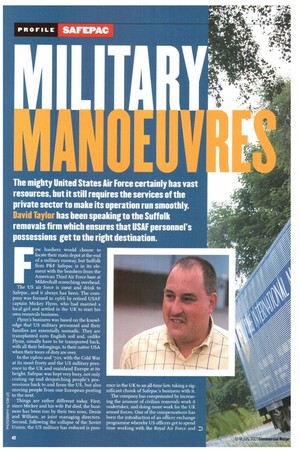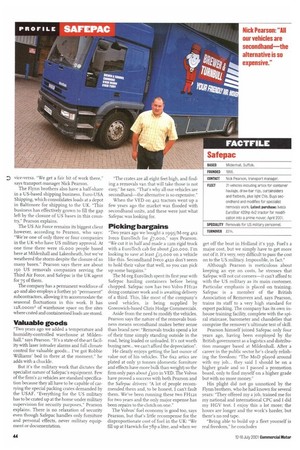The mighty United States Air Force certainly has vast resources,
Page 42

Page 44

If you've noticed an error in this article please click here to report it so we can fix it.
but it still requires the services of the private sector to make its operation run smoothly. David Taylor has been speaking to the Suffolk removals firm which ensures that USAF personnel's possessions get to the right destination.
IFew hauliers would choose to locate their main depot at the end of a military runway, but Suffolk firm P&F Safepac is in its element with the bombers from the American Third Air Force base at Mildenhall screeching overhead. The US air force is meat and drink to Safepac, and it always has been. The company was formed in 1966 by retired USAF captain Mickey Flynn, who had married a local girl and settled in the UK to start his own removals business.
Flynn's business was based on the knowledge that US military personnel and their families are essentially nomadic. They are transplanted onto English soil and, unlike Flynn, usually have to be transported back, with all their belongings, to their native USA when their tours of duty are over.
In the 1960s and '7os, with the Cold War at its most frosty and the US military presence in the UK and mainland Europe at its height, Safepac was kept very busy, not only crating up and despatching people's possessions back to and from the US, but also moving people from one European posting to the next.
Things are rather different today. First, since Mickey and his wife Pat died, the business has been run by their two sons, Denis and William, as joint managing directors. Second, following the collapse of the Soviet Union, the US military has reduced is pres
ence in the UK to an all-time low, taking a significant chunk of Safepac's business with it.
The company has compensated by increasing the amount of civilian removals work it undertakes, and doing more work for the UK armed forces. One of the compensations has been the introduction of an officer exchange programme whereby US officers get to spend time working with the Royal Air Force and
0 vice-versa. "We get a fair bit of work there," says transport manager Nick Pearson.
The Flynn brothers also have a half-share in a US-based shipping business, Euro-USA Shipping, which consolidates loads at a depot in Baltimore for shipping to the UK. "This business has effectively grown to fill the gap left by the closure of US bases in this country,Pearson explains.
The US Air Force remains its biggest client however, according to Pearson, who says: "We're one of only three or four companies in the UK who have US military approval. At one time there were 16,000 people based here at Mildenhall and Lakenheath, but we've weathered the storm despite the closure of so many bases." Pearson says there are about 150 US removals companies serving the Third Air Force, and Safepac is the UK agent for 75 of them.
The company has a permanent workforce of 40 and also employs a further 30 "permanent" subcontractors, allowing it to accommodate the seasonal fluctuations in this work. It has 128,000rri2 of warehouse space on five sites where crated and containerised loads are stored.
Valuable goods
"Two years ago we added a temperature and humidity-controlled warehouse at Mildenhall," says Pearson. "It's a state-of-the-art facility with laser intruder alarms and full climate control for valuable goods... I've got Robbie Williams' bed in there at the moment,he adds with a chuckle.
But it's the military work that dictates the specialist nature of Safepac's equipment. Few of the firm's 21 vehicles are standard specification because they all have to be capable of carrying the special packing crates demanded by the USAF. "Everything for the US military has to be crated up at the home under military supervision for security purposes," Pearson explains. There is no relaxation of security even though Safepac handles only furniture and personal effects, never military equipment or documentation.
"The crates are all eight feet high, and finding a removals van that will take those is not easy," he says. "That's why all our vehicles are secondhand—the alternative is so expensive."
When the VED on 452 tractors went up a few years ago the market was flooded with secondhand units, and these were just what Safepac was looking for.
Picking bargains
"Two years ago we bought a 1995/M-reg 4x2 Iveco EuroTech for £7,000," says Pearson. "We cut it in half and made a 12M rigid truck with a EuroTech cab for about £20,000. I'm looking to save at least £15,000 on a vehicle like this. Secondhand Iveco 4x2s don't seem to hold their value that well, so you can pick up some bargains."
The M-reg EuroTech spent its first year with Safepac hauling containers before being chopped. Safepac now has two Volvo FF1i2s doing container work and is awaiting delivery of a third. This, like most of the company's used vehicles, is being supplied by Greenwich-based Chris Hodge Commercials.
Aside from the need to modify the vehicles, Pearson says the nature of the removals business means secondhand makes better sense than brand new: "Removals trucks spend a lot of their time simply standing outside in the road, being loaded or unloaded. It's not worth buying new.., we can't afford the depreciation".
He dearly enjoys getting the last ounce of value out of his vehicles. The 6x2 artics are plated at only 31 tonnes (domestic furniture and effects have more bulk than weight) so the firm only pays about £300 in VED. The Volvos have proved a success with both Pearson and the Safepac drivers: "A lot of people recommended them and, to be honest, I can't fault them. We've been running these two FHI2s for two years and the only major expense has been repairs to the clutch on one."
The Volvos' fuel economy is good too, says Pearson, but that's little recompense for the disproportionate cost of fuel in the UK: "We fill up at Harwich for 78p a litre, and when we get off the boat in Holland it's 39p. Fuel's a major cost, but we simply have to get more out of it. It's very, very difficult to pass the cosi on to the US military. Impossible, in fact."
Although Pearson is meticulous about keeping an eye on costs, he stresses that Safepac will not cut corners—it can't afford to with the US military as its main customer. Particular emphasis is placed on training. Safepac is a member of the British Association of Removers and, says Pearson, trains its staff to a very high standard for export packing. The company has its own inhouse training facility, complete with the spiral staircase, barometer and chandelier that comprise the remover's ultimate test of skill.
Pearson himself joined Safepac only four years ago, having been employed by the British government as a logistics and distribution manager based at Mildenhall. After a career in the public sector he's clearly relishing the freedom: "The MoD played around with my job... they said I should be on a higher grade and so I passed a promotion board, only to find myself on a higher grade but with no more money."
His plight did not go unnoticed by the Flynn brothers, who he had known for several years: "They offered my a job, trained me for my national and international CPC and I did my HGV test. I enjoy this a lot more; the hours are longer and the work's harder, but there's no red tape.
"Being able to build up a fleet yourself is real freedom," he concludes








































































































